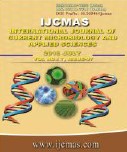


 National Academy of Agricultural Sciences (NAAS)
National Academy of Agricultural Sciences (NAAS)

|
PRINT ISSN : 2319-7692
Online ISSN : 2319-7706 Issues : 12 per year Publisher : Excellent Publishers Email : editorijcmas@gmail.com / submit@ijcmas.com Editor-in-chief: Dr.M.Prakash Index Copernicus ICV 2018: 95.39 NAAS RATING 2020: 5.38 |
In the contemporary, application of zinc oxide nanoparticles (ZnO NPs) is growing exponentially in the food industry and allied sciences. Hence the public concern about their potential adverse effect is increasing. ZnO NPs with their unique physiochemical properties are thought to underlie their exploitable immunological activities. A study was conducted to investigate the effects of ZnO NPs with innate immune cells. To achieve this aim, amongst three experimental groups, two groups received (5.0 and 50 mg/kg b.w), ZnO NPs was dispensed, subsequent analysis of the body, and different organs weight, cytotoxicity were done using (3-(4, 5-Dimethylthiazol-2-yl)-2, 5-diphenyl-tetrazolium bromide (MTT), Water-soluble tetrazolium salts (WST), Nitric oxide (NO), phagocytosis. The levels of NO yield, phagocytosis, and weight of spleen increased (*P<0.05) due to ZnO NPs at a dose of 50 mg/kg b.w, which harmed the functionality of macrophages. ZnO NPs may release Zn 2+ ions and producing reactive oxygen species and caused dose-dependent toxicity. The results demonstrate that the high dose of ZnO NPs caused toxicity which is the analysis by body and liver, kidney, and spleen weight, cell viability (MTT, WST), nitric oxide (NO) level, and phagocytosis assay. The levels of NO production, phagocytic activity, and spleen weight increased significantly (*P < 0.05) while a decrease in NO production and phagocytosis was observed. ZnO NPs (5.0 mg/kg b.w) caused significantly increased phagocytosis, therefore high at dose ZnO NPs caused immunocytotoxicity.
 |
 |
 |
 |
 |